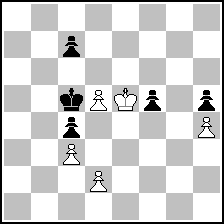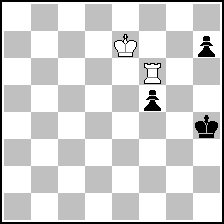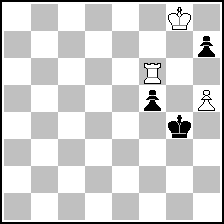
Website founded by
Milan Velimirović
in 2006
23:27 UTC


| |
MatPlus.Net  Forum Forum  X-Files: Anticipations X-Files: Anticipations  Study anticipated by analysis of a game Study anticipated by analysis of a game |
| |
|
|
|
|
You can only view this page!
| | | (1) Posted by Geir Sune Tallaksen Østmoe [Monday, Feb 11, 2013 10:32] | Study anticipated by analysis of a game
I am quite new to composing, and I would like some help on what to do about a study I have composed. I haven't seen this issue discussed elsewhere, but maybe some of you have experienced something similar before?
The study is inspired by a real OTB game where Black could have won by making a tempo move with his a-pawn, putting White in a study-like zugzwang. Black missed the win, and played a drawing continuation instead. Analysis of the game was published in a magazine, where the win was demonstrated.
I discvered that without the a-pawns, the position would be a study-like MUTUAL zugzwang, and the position inspired me to compose a study. I tried to further improve on the zugzwang position, but surprisingly, it appears that the game happened to get the ideal construction of the position. So the position arising in my study is indentical to the game, except that I removed two pawns. Without the two pawns, the position is a mutual zugzwang, where the drawing line was shown in the game, and the winning line was shown in the published analysis of the game. My contribution is mainly that I have added some introductory play where White has to lose a tempo in order to reach the zugzwang position with Black to move.
I would like to publish the study somehow, but I don't think I can take full credit for the study considering how similar it is to the game and the analysis. Do you have advice for what I should do? I can think of at least three possibilities:
- Add "after (players' names)"
- Add "after (annotator's name)"
- Contact the annotator and suggest to publish as co-authors
| | | (2) Posted by seetharaman kalyan [Monday, Feb 11, 2013 17:27] |
This question arose for the recent WCCT. The Director clarified that a game OTB does not anticipate a study (even if based on it).
| | | (3) Posted by Harry Fougiaxis [Monday, Feb 11, 2013 21:31] |
You probably refer to the claim to the D65 entry, don't you?
There was no answer to the claim. And, of course, the reply could not be mine.
| | | (4) Posted by Sarah Hornecker [Tuesday, Feb 12, 2013 05:17] |
It is true that a game does not anticipate a study. However, the analyses made by someone about the game may anticipate a study.
| | | (5) Posted by seetharaman kalyan [Tuesday, Feb 12, 2013 08:37] |
Not referring to the claim of D65. I am referring to the answer I got to a general query.
| | | (6) Posted by Kevin Begley [Tuesday, Feb 12, 2013 09:07] |
This can be a messy issue.
Even if you decide that the right path is to contact the annotator (not a bad idea!), can you honestly be certain that there are not multiple annotators (who published the same conclusion)?
If so, theoretically, I suppose you'd have to find the first published annotation -- which might prove a difficult matter (particularly if the players involved were well known, internationally).
In fact first publication may not be enough -- beyond the actual publication date, an editor for a problem publication would have to record the date of first receipt (which can be important in sorting out anticipation issues).
It is unlikely this information will have been preserved by a chess journal (and the longer you wait, the more difficult it may become).
So, you may want to quickly establish contact with the annotator you are aware of... and discuss the matter, as a possibility.
Also, it is entirely possible that the winning line was discussed in live commentary, during the game (which might be considered a publication).
Can you properly credit a kibitz, shared in live commentary, from some patzer following the game with a computer/EGTB?
As I said, this could be a very messy issue.
Nevertheless, if you believe you have added substantial value to the study (even by what may appear a slight alteration of the position), you certainly deserve some credit.
You are asking all the right questions, yet a definite answer (based upon established precedent) may still prove elusive.
If a definite answer is not provided here, I would suggest that you simply do your best to discern what you consider the proper credit for the problem, and offer this -- along with all the information you can provide! -- to a quality studies editor. Then, ask the editor to help determine if you are properly crediting the problem.
When you reach an agreement with the editor, make certain that all vital information is published (so that anyone, including the judge, has an opportunity to take issue with how you've credited the problem).
| | | (7) Posted by Hauke Reddmann [Tuesday, Feb 12, 2013 12:18] |
What, no longer satisfied being just an OTB IM? :P
Well, following another strong chess player, namely
Marcel Duchamp, art is what you declare as such,
and if you give proper credit, you should be fine
(at least in an informal tourney).
Hauke
| | | (8) Posted by Sarah Hornecker [Tuesday, Feb 12, 2013 17:43] |
Hauke, he sent a brillant entry to the Schwalbe. So stop flaming, you'll see soon enough (if the remaining issues and new ones are printed). :-)
| | | (9) Posted by Geir Sune Tallaksen Østmoe [Tuesday, Feb 12, 2013 20:30] |
Thanks for the replies! I suspected there was no easy answer to this, and I suppose the editor has the final word anyway. At least I will make sure to supply everything I know about the game.
@Hauke,
I realized it was getting hard to become Norway's strongest OTB player, so I started investigating another area. :P
Joking aside, I have always enjoyed solving chess problems. I composed a few (very light) directmates in my teenage years, but never managed to compose any studies. Last year, I decided to give it a try again, and suddenly I am hooked. :) Also, as a father of two small children, it is hard to find time for OTB play; it is much easier to find time for composing studies.
BTW, I am impressed that you knew my OTB title (unless you googled me!).
@Siegfried,
Thanks for the compliment. Do you get first-hand information on upcoming studies in the Schwalbe?
| | | (10) Posted by Sarah Hornecker [Tuesday, Feb 12, 2013 23:02] |
As the co-editor, I surely do. ;-)
| | | (11) Posted by Geir Sune Tallaksen Østmoe [Tuesday, Feb 12, 2013 23:26] |
Ah, I didn't know. That explains. :)
| | | (12) Posted by Sarah Hornecker [Friday, Apr 26, 2013 11:11]; edited by Sarah Hornecker [13-04-26] |
Dear Geir Sune Tallaksen Østmoe,
in the new EG there is doubt about the question if a game anticipates a study, regarding your study that was after a game but modified. Let me explain it with two examples, both taken from a wonderful German book "Das 1x1 des Endspiels" by HH Staudte & M Milescu.
 (= 5+5 ) (= 5+5 )
Breazu - Orban
Cluj 1958
White to move
Play went: 1.K:f5 K:d5 2.Kg5 Ke5 3.K:h5 Kf5 4.Kh6 Kf6 5.h5 c6! 6.Kh7 Kf7 7.h6 c5! draws
 (= 5+5 ) (= 5+5 )
Paul Farago
Shakhmaty v SSSR 1958
White wins
(yes, same position)
1.d6!! c:d6 2.K:f5 Kd5 3.Kg5 Ke5 4.K:h5 Kf5 5.Kh6 Kf6 6.h5 d5 7.Kh7 Kf7 8.h6 wins
 (= 2+3 ) (= 2+3 )
Hariel - Smiltiner
Tel Aviv 1963
Black to move
Play went: 1.-Kg4 2.Ke6 h5 3.Ke5 h4 4.Kd4 h3 5.Ke3 h2 6.Rg6+ Kh3 7.Kf2 h1S+ 8.Kf3 Kh2 9.Rg2+ Kh3 10.Rg5 Kh2 11.R:f5 Kg1 12.Rg5+ Kf1 13.Rg2 1-0
 (= 3+3 ) (= 3+3 )
Hillel Aloni
Shahmat 1963
Black to move, White wins
1.-K:h5 2.Kf7!! Kg4 3.Ke6! h5 4.Ke5 h4 5.Kd4 h3 6.Ke3 h2 7.Rg6+ Kh3 8.Kf2 h1S+ 9.Kf3 wins
Let us not look at the duals in both compositions, which mostly might go as minor.
In the first case, I would see no anticipation. In the second case, I would see an anticipation from move 3 because that is the analysis that Hariel has performed, i.e. that he created while playing.
This means that there actually must have been a misunderstanding. The actual score of a game of course can be an anticipation, since it consists of the analysis performed of the players. In my opinion while a game is not a joint composition, the moves of one side can count as a creation or analysis by that player since he thought those to be the best in that position. The kudos would go for Hillel Aloni to point out it is the only win - if it was - but a lot of the work was already performed by Hariel, so I would think it is correct to attribute the study to both.
In the case you did in EG, I think your attribution is correct.
Best,
Siegfried
| | | (13) Posted by Geir Sune Tallaksen Østmoe [Tuesday, Apr 30, 2013 21:10] |
Thanks for your clarification, Siegfried. The examples make sense to me.
Apparently, when searching for anticipations to a study, this implies that one should search in game databases in addition to HvdH's database.
| | | (14) Posted by Hauke Reddmann [Saturday, Feb 12, 2022 19:34] |
Note added ten years later: Now I could swear
some 1st prize study in the Moscow 2019 tourney
was based on an OTB game... :-)
| | | (15) Posted by Joose Norri [Monday, Feb 14, 2022 18:42] |
The score of a game is generally regarded as a description of an event, That's how it has been seen when discussing copyright questions. So it cannot be an anticipation of a study, I think - in the sense that the study would be disqualified because of that. But an analysis surely can.
| | | (16) Posted by Andrew Buchanan [Tuesday, Feb 15, 2022 03:11] |
It would be cool if games were disqualified if found to be anticipated by an earlier composition or game :-)
| | | (17) Posted by James Malcom [Tuesday, Feb 15, 2022 05:15] |
Sorry Carlsen, but your last-minute winning gameplay was already used by some Russian composer's study back in 1993 in an obscure magazine in a barely existent town in the first and the only issue ever published of a failed magazine. You are henceforth stripped of your World Championship title!
| | | (18) Posted by Joose Norri [Tuesday, Feb 15, 2022 06:16] |
Well there are many cases... Svidler agreed a draw in a game with Anand in a winning position, which had just previously been the finish of a study, I mentioned this in New in Chess and/or EG.
| |
No more posts |
MatPlus.Net  Forum Forum  X-Files: Anticipations X-Files: Anticipations  Study anticipated by analysis of a game Study anticipated by analysis of a game |
|
|
|
 ISC 2024
ISC 2024 Forum
Forum  X-Files: Anticipations
X-Files: Anticipations  Study anticipated by analysis of a game
Study anticipated by analysis of a game 


